All cat parents would concede that cuddling with their little furry friend while she purrs away is just about the most soothing and satisfactory feeling in the world.
This burst of joy is not just a coincidence, rather, the benefits of a cat’s purring are backed by science-based evidence and research.
According to AKC ReUnite, “Those who don’t have cats are missing out on the cats’ appeal. The reality is that behind all of the warm cuddles and purring is an animal that improves mental health by decreasing stress, offering companionship, purring the pain away, and serving as a therapy animal.”
If you want to know more about the positive effects your cat’s purring has on your health, read the rest of the article.
Key Takeaways
- Purring is a vocal characteristic of cats akin to meowing. A cat purrs to express her feelings of happiness and contentment.
- A cat could purr while laying on you to mark territory, listen to your heartbeat, or in an attempt to get warmer.
- Petting and spending time with your cat releases calming and happy hormones such as endorphins which immediately permeate your senses and work wonders for relaxing you
- Even people who don’t own a cat, but have integrated with one at some point in their life, have reported a positively lower risk of cardiovascular disease.
- Although cat purring is a wonderful healing sound and should be most encouraged, if you suffer from allergies or don’t want your kitten to purr on you, then you can try directing her attention elsewhere.
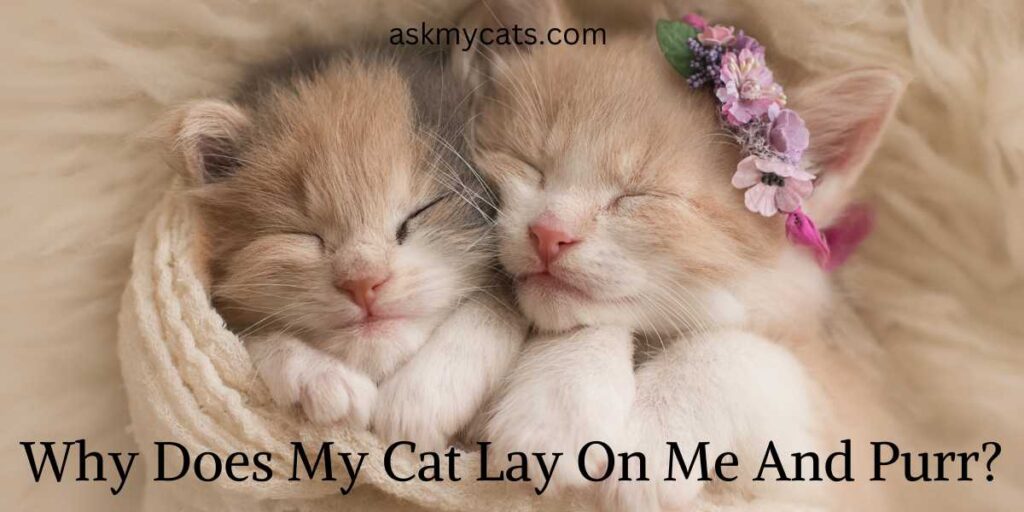

Give Your Cat the Perfect Day
Get the Free Ebook!
Why Does My Cat Purr While Lying On Me?
Purring is a vocal characteristic of cats akin to meowing. While both are used as a method of communicating with others, purring is much more specific in nature.
Generally, a cat purrs to express her feelings of happiness and contentment.
Cats do not have a specialized organ that enables them to purr.
Purina explains that “ Purring involves the rapid movement of the muscles of the larynx (voice box), combined with movement of the diaphragm (the muscle at the base of the chest cavity). The muscles move at around 20 to 30 times per second.”
Purina
Cats exhibit this rasp during both inhalation and exhalation. Purring is a special kind of sound and there are only a few occasions that call for a cat’s purring.
Here are some of them:
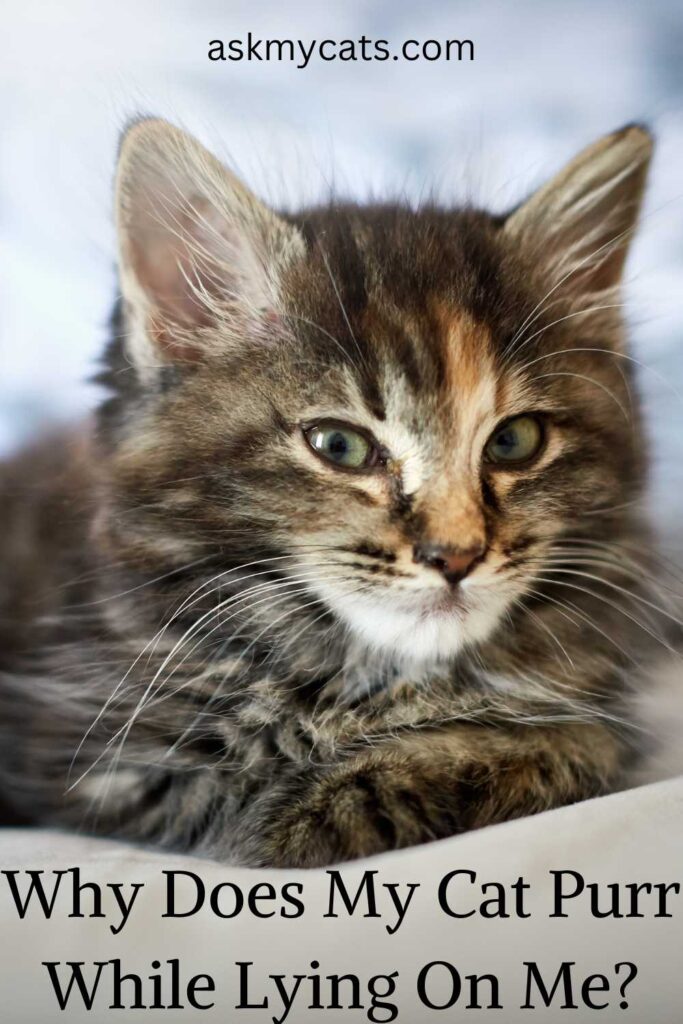
1. Your Cat Feels Safe With You
As we touched upon earlier, one of the primary reasons behind a cat’s purr is that she is as happy as she can be. I
If you share a firm and strong bond with your kitten, then it is likely that she will feel secure and protected around you.
Thus, your cat purrs while laying on you because she wishes to reflect the joy that spending time with you brings her.
2. Marking Territory
It is no secret that cats are fiercely possessive creatures. They like to mark territory over the things ( or people) that they claim as theirs.
One of the ways through which they mark their territory is by scent-marking. When a cat purrs, it releases its pheromones. Hence, if your cat purrs on you, she could be marking you as her territory.
3. Stress
You might be wondering, ‘How can an animal experience sadness, much less stress?’ However, the reality is that no living creature on this planet is free from anxiety or fear. This also includes cats.
Cats feel apprehensive when they enter unfamiliar situations or when having medical ailments. As a cat parent, you are your cat’s source of comfort and solace.
Therefore she will rely on you to alleviate her pain and this takes the form of lying on you and purring.
4. Listening To Your Heartbeat
Young kittens often snuggle against their mother’s bellies to seek warmth and comfort. As they growl older, they substitute their mothers with their human parents.
Thus, your kitten might be cuddling against your chest to listen to the reassuring sound of your heartbeat which signifies that she is well-protected and cared for.
Interesting Read: Why Does My Cat Purr And Bite Me?
5. Trying To Get Warmer
Cats love sleeping and cuddling in warm places.
According to PetWellClinic “ Cats’ normal body temperatures can range from 99.5°F to 102.5°F, and maintaining that temperature takes work”.
PetWellCLINIC
Thus, your kitten might be laying on you simply to get warmer and use your body heat.
Statistic Alert
According to a survey of cat owners conducted by the American Pet Products Association (APPA), approximately 37% of cats in the United States sleep with their owners at least some of the time.
American Pet Products Association (APPA)
Interesting Read: Why Do Cats Purr?
Factors That May Affect Why Cats Lay On Their Owners and Purr
| Factor | Description |
|---|---|
| Age and maturity | Kittens and young cats may be more likely to lay on their owners and purr as a way to bond and seek attention. Older cats may be more likely to do so for warmth or as a way to mark territory. |
| Breed and genetics | Some cat breeds are more prone to seeking attention and bonding with their owners, while others may be more independent. Genetics can also play a role in a cat’s behavior and personality. |
| Environment and socialization | Cats that have been exposed to a variety of people and situations during their socialization period (typically the first few months of life) may be more comfortable and confident in seeking attention and bonding with their owners. Cats that have experienced stress or trauma may be more prone to self-soothing behaviors like laying on their owners and purring. |
Potential Benefits Of Purring And Physical Contact For Both Cats And Their Owners
You’re likely no stranger to the fact that snuggling with your purring kitten soothes your frayed nerves and helps calm you down. The healing power of a kitten’s purr is scientifically proven and here are examples of the same:
1. Alleviating Stress
Petting and spending time with your cat releases calming and happy hormones such as endorphins which immediately permeate your senses and work wonders for relaxing you.
In a study by Verywell Mind, it was found that for approximately 47% of Americans in therapy, spending time with their pets improved their mental health.
VeryWell Mind
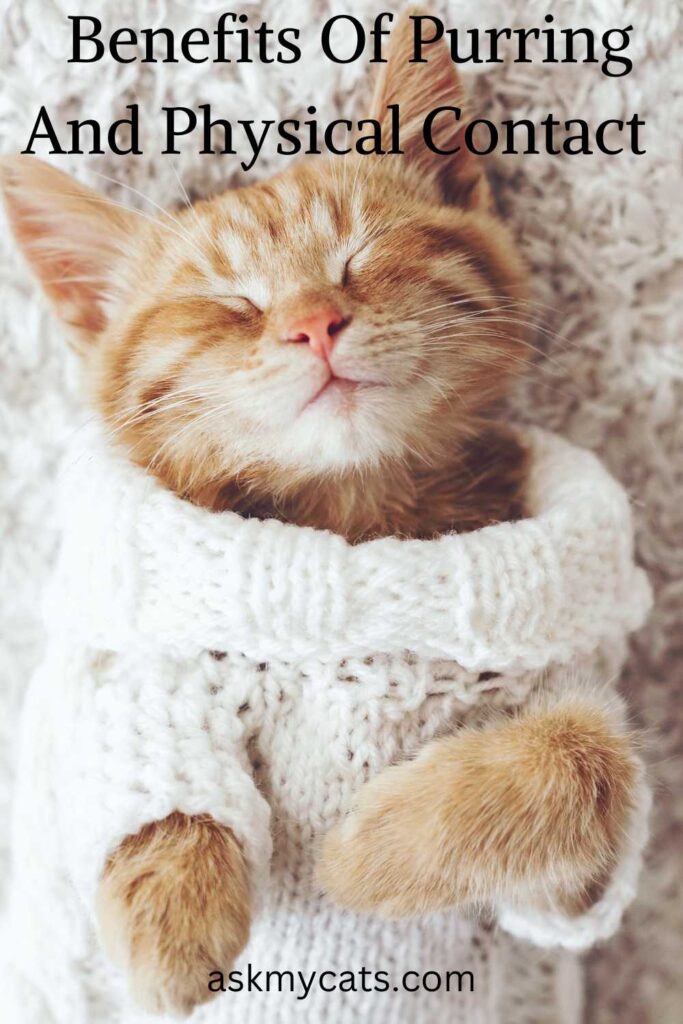
2. Lowering Blood Pressure
The physical act of petting your cat and snuggling with her can have enormous benefits on your blood pressure levels.
The frequencies at which cats purr correspond with the vibrations used to promote human health. A cat’s purring is capable of regulating and lowering your blood pressure levels.
3. Lowering Heart Diseases.
As various studies have concluded, cat purring lowers stress and anxiety. This has a domino effect on heart-related ailments as well.
Even people who don’t own a cat, but have integrated with one at some point in their life, have reported a positively lower risk of cardiovascular disease. These benefits are seen for several years.
According to Goodnet “ Owning a cat can actually lower one’s risk of various heart diseases, including stroke, by around 30 percent.”
Goodnet
4. Bone Healing
The research behind this relates to using sounds and vibrations for treating human injuries. It has been found that rhythms between 25 and 50 Hertz are ideal for bone healing and growth.
Cats also purr between the same frequencies i.e 20 – 140 Hz.
5. Better Sleep
A study by Mayo Clinic for Sleep Medicine discovered that 41% of the participants reported that they slept better with their pets and only 20% claimed that it led to disturbances.
While another research conducted in the U.K. found that a majority of people (especially women) preferred to sleep with their cats rather than their partners.
Thus, sleeping with your purring kitten will also work wonders for a peaceful night of sleep.
Interesting Read: Do Cats Purr When They Sleep?
Tips for Encouraging Cats to Lay On Their Owners and Purr
A study published in the journal Applied Animal Behaviour Science found that cats were more likely to lay on their owners and purr when their owners were interacting with them, such as petting or grooming them.
journal Applied Animal Behaviour Science
Must Read: How To Make A Cat Purr?: 7 Simple Tricks
| Tip | Description |
|---|---|
| Provide a comfortable and warm place for your cat to lay | Cats are more likely to lay on their owners if they have a comfortable and warm place to do so. Consider providing a cozy bed or blanket for your cat to snuggle up in. |
| Spend quality time with your cat | Cats are more likely to lay on their owners and purr if they feel loved and well-cared for. Make time to play with your cat, groom them, and offer treats and praise. |
| Respect your cat’s boundaries and independence | Cats are unique and individual animals, and it’s important to respect their boundaries and needs. If your cat is not interested in laying on you or seeking attention, respect their wishes and give them space. |
Interesting Read: Why Do Cats Purr When You Stroke Them?
Potential Risk And Drawbacks
There are so many reasons why you would prefer and want your furball to lie down on you.
However, there are also certain risk factors and adverse consequences that you don’t want to ignore.
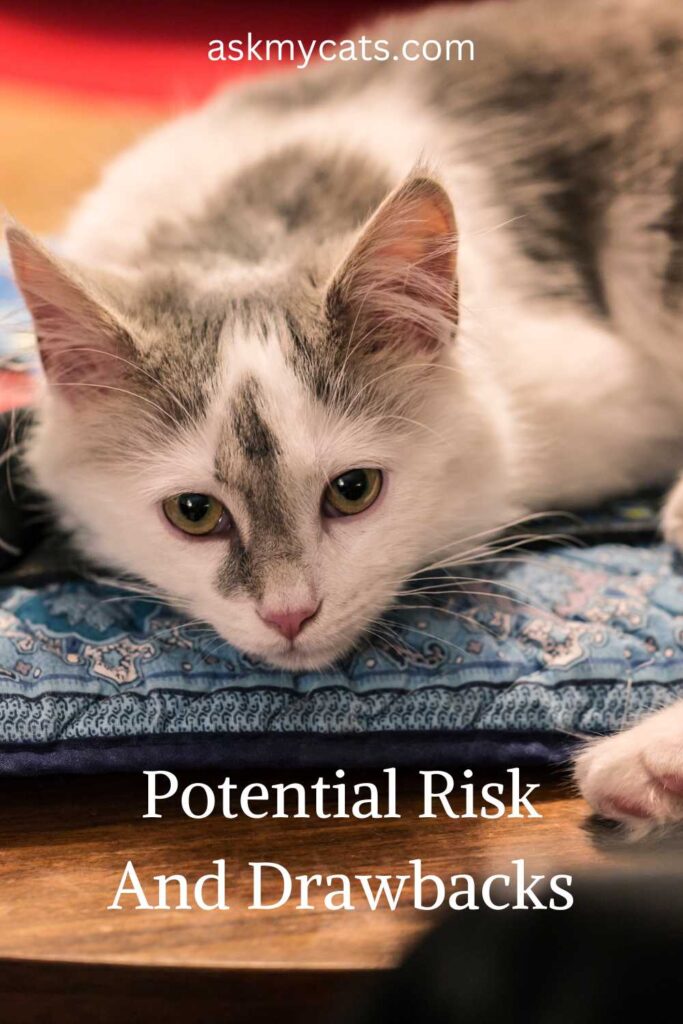
1. Allergies
If you have allergies or someone in your family does, then it will be better to maintain some distance from your kitten.
There is a particular protein in cats’ dander that can cause and further aggravate existing allergies. Some breeds have fewer proteins than others, such as Maine Coon.
2. Germs and Infections
Cats can, at times, harbor numerous pathogens and harmful bacteria, if they are not cleaned frequently and efficiently. This is especially true in the case of outside cats.
People with asthma are also highly vulnerable to infections and germs brought about by cats.
Must Read: Cat Purring Effect On Humans: The Power of Cat Purring
3. Exposure To Litter Box Debris
Litter boxes are not particularly hygienic places and the debris from your cat’s litter box can get stuck to her paws. If she climbs on you with dirty paws, then those bacteria are highly transmissible and can affect your health and well-being.
4. Threat To Young Children
Your cat could inadvertently hurt young children with her paws and cause extreme injuries. Cats can grow attached to babies and might be protective of them.
This innocent nature can lead cats to purr near children and snuggle close to them, however, they can accidentally hurt them in the process.
5. Loud Purrs
Every cat is unique and has its own modulation and way of purring. Some cats purr extremely loud and this can adversely affect your eardrums.
Must Read: Why Does My Cat Purr So Loudly?
Tips For Redirecting Your Cat’s Purring
Although cat purring is a wonderful healing sound and should be mostly encouraged, if you suffer from allergies or don’t want your kitten to purr on you, then you can try directing her attention elsewhere.
You can do this by indulging her with lots of play and providing opportunities for exercise and physical exertion. This will help in maintaining your feline friend’s health in optimal condition. Providing obstacle courses around the house takes care of their climbing needs.
Try to keep your kitten as happy and stress-free as possible. If your kitten insists on laying next to you and purring, then you can occupy her with cat toys or treats.
Some of the Interesting reads regarding cat purring:
- Why Do Cats Lick And Knead You?
- Why Doesn’t My Cat Purr?
- Do Cats Purr When Stressed?
- Why Do Cats Purr When They Are Dying?
- Why Does My Cat Purr When He Sees Me?
- Why Is My Cat Purring So Much?
- Can Cats Control Their Purring?
- Do Cats Purr When They Are Happy?
- Differences In Purring Between Cat Breeds
- Why Do Cats Purr When You Talk To Them?
- Why Does My Cat’s Purring Sound Congested?
- Do Cats Breathe Faster When Purring?
- Why Do Cats Wag Their Tails While Purring?
- How To Purr Like A Cat?
- Why Is My Pregnant Cat Purring So Much?
- Why Do Cat’s Noses Get Wet When They Purr?
- Why Do Cats Purr And Knead?
- Do Cats Purr When They Are Sick Or In Pain?
- Do Feral Cats Purr?
Frequently Asked Questions
Should you let your cat sleep on you?
You can most definitely let your cat lay down on you and purr, especially when you are feeling stressed or lethargic. When your cat purrs while you are petting or snuggling with her, she is trying to communicate her love and affection for you. You should cherish these tender moments with your kitten.
Why does my cat lay on me all the time?
If your cat is super clingy, then that means you are at the top of her favorite person’s list. Cats like spending time with their cat parents and share a special bond with them. Your kitten expresses through her purrs that she is feeling happy and content. She could also be laying on you for warmth or listening to her favorite person’s heartbeat.
Final Thoughts
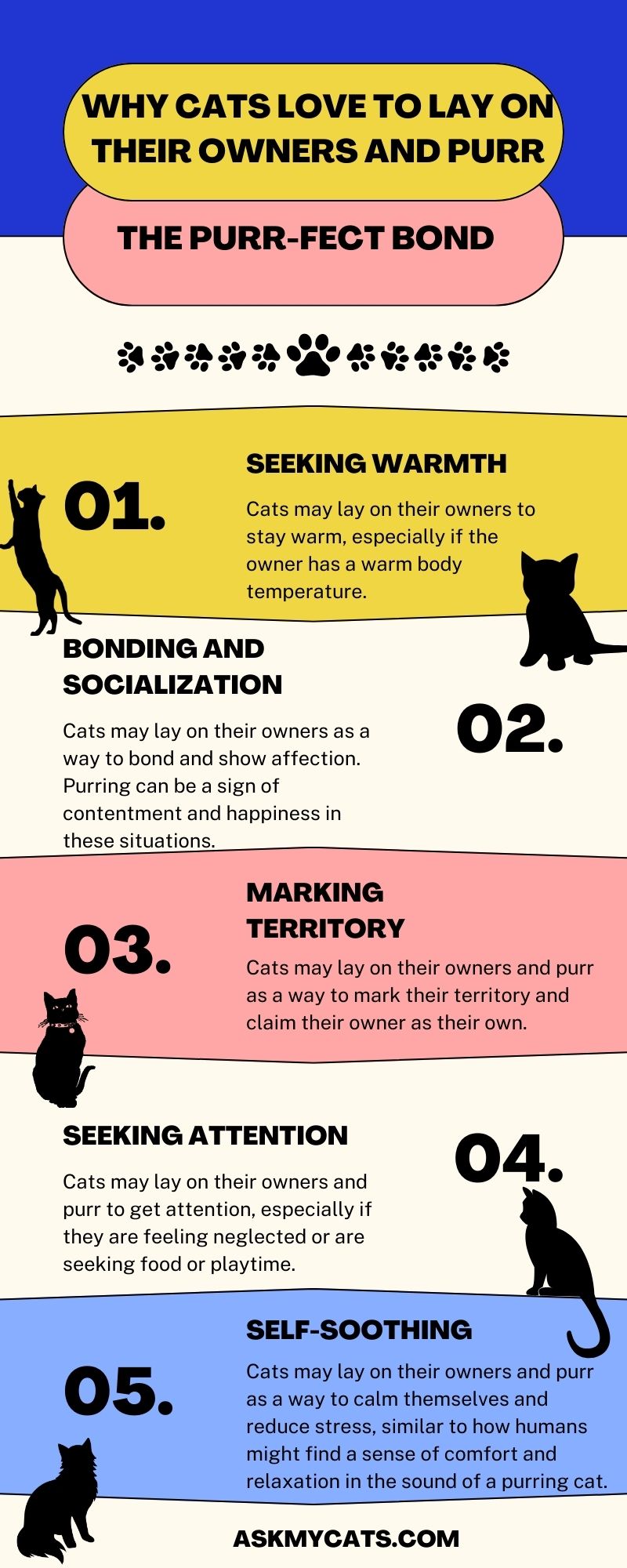
Snuggling with your kitten is one of the most incredible experiences in the world and not just because it shows that your kitten loves you.
A cat’s purr has some powerful healing properties and is capable of lowering your stress and anxiety and creating a calm environment altogether. It is also used for bone healing, muscle growth, and tissue regeneration.
However, close contact with cats could be hazardous for people with allergies and asthma as they are especially vulnerable to infections and harmful bacteria flu’s. Therefore, it is advised for them to maintain their distance as much as possible.
Must Read: why is my cat sleeping next to me all of a sudden
Interesting Read: Why Does My Cat Drool When He Purrs?
References
- https://www.akcreunite.org/catsimprovementalhealth/
- https://www.petwellclinic.com/wp/2022/04/02/why-cats-lay-on-your-chest/
- https://www.today.com/health/should-your-pets-sleep-bed-you-new-studys-surprising-answers-t61266
- https://books.google.de/books?id=TsQSJVXt5VEC&pg=PT11&lpg=PT11&dq=half+of+people+sleep+better+with+cat+than+partner&source=bl&ots=OsJWREsocm&sig=nXwp9UyLHqshHoIWSPNiEMad4W0&hl=en&sa=X&redir_esc=y#v=onepage&q=half%20of%20people%20sleep%20better%20with%20cat%20than%20partner&f=false
